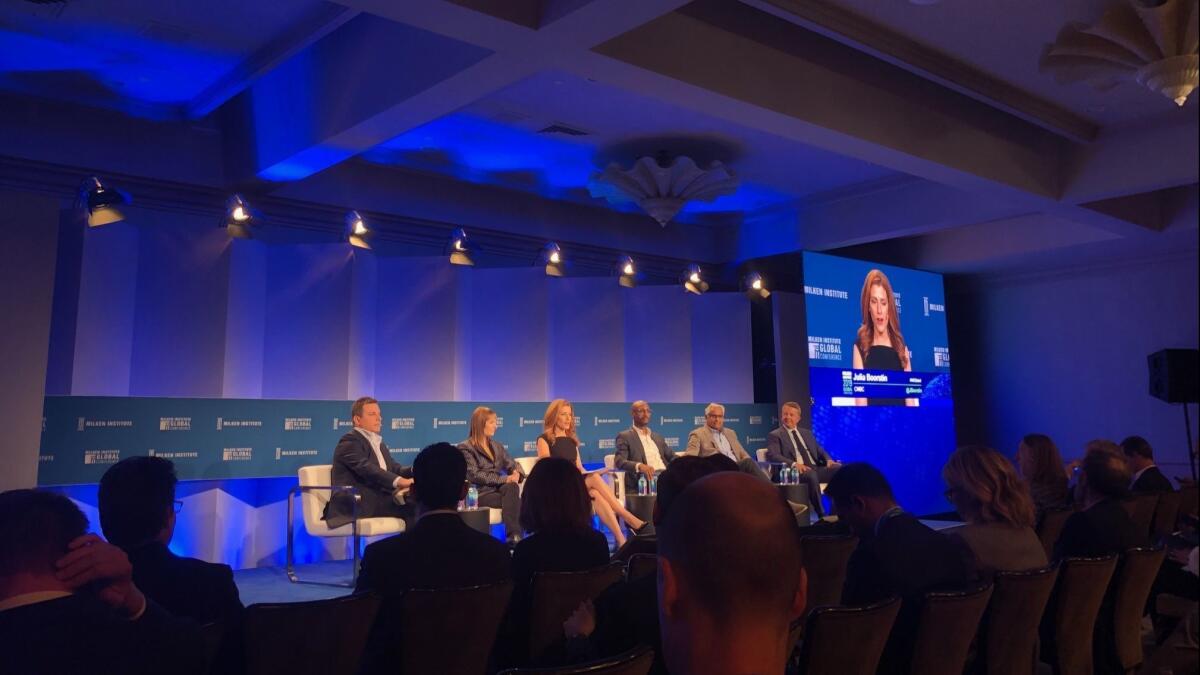United Talent Agency’s CEO weighs in on Writers Guild standoff

- Share via
United Talent Agency Chief Executive Jeremy Zimmer waded into the fight between agencies and writers, defending the industry’s controversial use of packaging fees but also expressing support for options that could increase the amount of money writers make on shows.
“We are willing to sit down and try to work toward a resolution,” Zimmer said in an interview in Beverly Hills on Thursday, before he spoke on a panel about the future of entertainment at the Milken Institute Global Conference.
“We feel some of the issues that have been raised are legitimate and need to be worked through,” Zimmer added. “Some of the vitriol around the issues have created a sort of polarizing environment which probably isn’t that productive.”
The Writers Guild of America instructed its members last month to fire agents who did not sign on to a new code of conduct that restricts long-standing practices, including the use of packaging fees, that the union believes benefit agents at the expense of writers. Hollywood’s largest agencies, however, have said the code, which replaces a 43-year-old agreement, would undermine their business.
Zimmer said he believes looking for ways in which writers can get more so-called span protection — the amount of money writers are paid for time they spend working on episodes — is legitimate.
Writers are getting paid less because streaming shows have fewer episodes than network productions and typically don’t provide royalties.
Zimmer questioned whether streaming platforms should consider paying shows based on the number of streams.
But Zimmer defended the practice of packaging fees, money that agencies collect by bundling talent such as actors, writers and directors, for projects. The Writers Guild of America believes agents have put the needs of earning packaging fees over the needs of writers.
Zimmer pointed out on his panel that when talent, including writers, participate in a package, they don’t pay a 10% commission fee.
“It’s our way of investing in programming that we believe in, by not collecting a commission and investing in the back end,” Zimmer said. When the shows do well, the agencies make money and when they don’t, “we lose money,” he said of the agencies. “It’s surprising to me that we are having this fight at this time,” Zimmer said.
But writers believe packaging fees have eroded their income.
“The studios pay the agencies for access to cheaper talent,” Chris Keyser, co-chair of the WGA’s negotiating committee, said in an update posted on the guild’s website Wednesday, adding the agencies have not shared how much the studios pay. “They would rather have this war with us than tell us the truth about what we’re worth to them.”
As subscription streaming platforms continue to grow with Disney+ and Apple TV+ launching this year, Zimmer said he hopes popular and long-standing shows such as Netflix’s political drama series “House of Cards” could be licensed elsewhere and generate royalty payments for writers.
“I can imagine a world where there are secondary markets for content that is made for streamers,” he said during the panel.
More to Read
The biggest entertainment stories
Get our big stories about Hollywood, film, television, music, arts, culture and more right in your inbox as soon as they publish.
You may occasionally receive promotional content from the Los Angeles Times.











